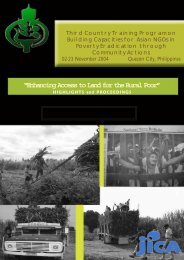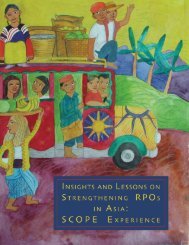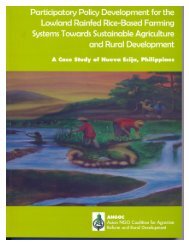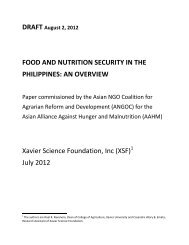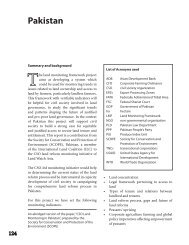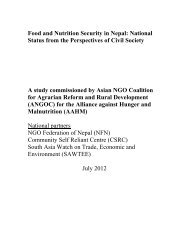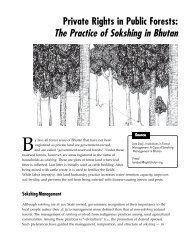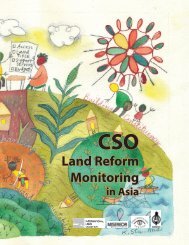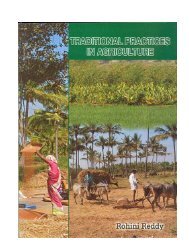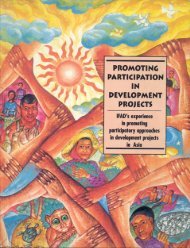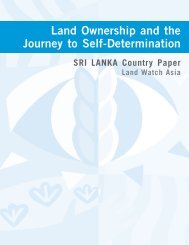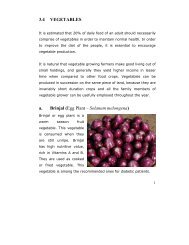Securing the Right to Land FULL - ANGOC
Securing the Right to Land FULL - ANGOC
Securing the Right to Land FULL - ANGOC
Create successful ePaper yourself
Turn your PDF publications into a flip-book with our unique Google optimized e-Paper software.
From an examination of <strong>the</strong> budget, it is clear which sec<strong>to</strong>rs<br />
are prioritized by <strong>the</strong> Government. The draft national budget<br />
for 2008 provides for an increase in budget allocation for<br />
infrastructure development, through two departments: <strong>the</strong><br />
Department of Public Works (DPU) and <strong>the</strong> Department of<br />
Transportation. The DPU budget increased by 41% percent,<br />
<strong>to</strong> Rp 35.6 trillion, and <strong>the</strong> Transport Department’s budget,<br />
by 64%, <strong>to</strong> Rp 16.2 trillion. Meanwhile, <strong>the</strong> allocation for<br />
agricultural programs was only Rp 14.1 trillion.<br />
Infrastructure projects under DPU supervision, such as <strong>the</strong><br />
construction of artery and <strong>to</strong>ll roads or dams, are ano<strong>the</strong>r<br />
indication of where <strong>the</strong> Government’s true priorities lie. It is<br />
widely known that infrastructure developments, especially<br />
<strong>the</strong> very big dams, would submerge fertile agricultural<br />
lands. O<strong>the</strong>r infrastructure, such as <strong>to</strong>ll roads, have already<br />
buried many fertile farmlands under concrete. These developments<br />
lead <strong>to</strong> food policy challenges, because when land<br />
conversion is done systematically—under <strong>the</strong> pretext of infrastructure<br />
development—more and more agricultural land<br />
would be converted permanently <strong>to</strong> non-agricultural use.<br />
Mining is ano<strong>the</strong>r priority sec<strong>to</strong>r because it generates <strong>the</strong><br />
highest foreign exchange revenues for <strong>the</strong> Government.<br />
According <strong>to</strong> data from Kompas, <strong>the</strong> expected revenues<br />
from <strong>the</strong> mining sec<strong>to</strong>r in 2007 was Rp 5.74 trillion, a significant<br />
increase from earnings reported in 2006. This kind<br />
of earning power is contingent on large-scale mining operations,<br />
such as those of PT Freeport Indonesia, Inco, Newmont<br />
Nusa Tenggara, and Arutmin, which generated Rp 663 billion,<br />
Rp 154 billion, Rp 169 billion, and US$25 million, respectively,<br />
in 2007 3<br />
This is <strong>the</strong> reason why, despite widespread acknowledgment<br />
that <strong>the</strong> activities of mining concessions cause great damage<br />
<strong>to</strong> <strong>the</strong> environment, <strong>the</strong> Government continues <strong>to</strong><br />
award mining permits.<br />
For similar reasons, <strong>the</strong> Department of Agriculture, <strong>the</strong> Department<br />
of Trade, and Bulog continue <strong>to</strong> import food products<br />
(especially rice) in spite of <strong>the</strong> drain on foreign reserves.<br />
The Government rationalizes such importation on <strong>the</strong><br />
grounds that national food security must be safeguarded.<br />
The foreign exchange that one department generates at<br />
<strong>the</strong> cost of environmental degradation is <strong>the</strong>n squandered<br />
THE PERSISTENCE OF POPULAR WILL<br />
103<br />
by ano<strong>the</strong>r state agency <strong>to</strong> pay for imported food products,<br />
which could have been produced domestically. Policies<br />
and practices along <strong>the</strong>se lines exacerbate environmental<br />
damage, force people off <strong>the</strong>ir lands, and push <strong>the</strong> country<br />
headlong in<strong>to</strong> a food crisis. All <strong>the</strong> while, <strong>the</strong> goal of reducing<br />
poverty and unemployment becomes more difficult<br />
<strong>to</strong> realize, even though macro-economic indica<strong>to</strong>rs show<br />
improvement.<br />
According <strong>to</strong> <strong>the</strong> former Coordinating Minister for Economic<br />
Affairs, Kwik Gian Kie, <strong>the</strong> country’s leaders are <strong>to</strong>o easily<br />
swayed by signs of macro-economic stability and growth, in<br />
spite of <strong>the</strong> great numbers of people who are poor and unemployed.<br />
Growth in GDP, a stable exchange rate, and o<strong>the</strong>r<br />
signs of improvement such as <strong>the</strong> s<strong>to</strong>ck index or inflation<br />
rate, can coincide with extraordinary poverty. 4<br />
Revocation of Anti-Peasant <strong>Land</strong> Laws<br />
The enactment of TAP MPR No.IX/2001 has <strong>the</strong> potential <strong>to</strong> give<br />
<strong>the</strong> peasant movements and <strong>the</strong> agrarian struggle new momentum.<br />
The TAP MPR No.IX/2001 declares that “<strong>the</strong> prevailing<br />
agrarian/natural resources management has been creating environmental<br />
degradation, inequality of land control and ownership,<br />
and agrarian conflicts.” The Decree goes on <strong>to</strong> instruct <strong>the</strong><br />
House of Representatives (DPR) and <strong>the</strong> Indonesian President<br />
“<strong>to</strong> immediately withdraw, amend, and/or <strong>to</strong> change any laws<br />
and related regulations that are not suited with this Decree”<br />
(Article 6). The MPR Decree on Agrarian Reform and Natural<br />
Resources Management also gives <strong>the</strong> Government <strong>the</strong> mandate<br />
“<strong>to</strong> implement […] land reform, <strong>to</strong> solve agrarian conflicts,<br />
and <strong>to</strong> provide […] <strong>the</strong> funds for [<strong>the</strong>] agrarian reform program<br />
and resolution of agrarian conflicts” (Article 5).<br />
TAP MPR No.IX/2001 thus gives agrarian advocates and <strong>the</strong><br />
peasant movement in Indonesia <strong>the</strong> legal right <strong>to</strong> push <strong>the</strong> Government<br />
<strong>to</strong> implement land reform (including <strong>the</strong> unfinished<br />
land reform of <strong>the</strong> 1960s) and <strong>to</strong> solve agrarian conflicts.<br />
Despite such a law, <strong>the</strong> land occupation and land reclamation<br />
that have taken place in many parts of Indonesia during <strong>the</strong><br />
reform era (1998–present), which could be viewed as change<br />
from below and a manifestation of peasant struggles, are still<br />
regarded by <strong>the</strong> Government as illegal acts. At <strong>the</strong> same time,<br />
<strong>the</strong> Government has passed several laws that contravene <strong>the</strong><br />
intent of TAP MPR No.IX/2001, such as <strong>the</strong> Law No.18 of 2004<br />
on Plantations and Law No. 25 of 2007 on Capital Investments.<br />
ASIAN NGO COALITION FOR AGRARIAN REFORM AND RURAL DEVELOPMENT



